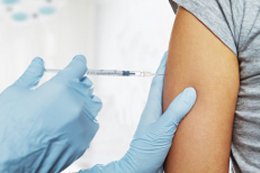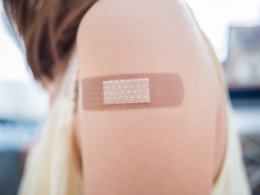 Shoulder injuries related to vaccine administration (SIRVA) are painful, debilitating and potentially long-term injuries that can lead to substantial medical bills and other financial and non-financial costs. They are among the most common types of vaccine injuries, and each year we help dozens of individuals obtain compensation for SIRVA under the National Vaccine Injury Compensation Program (VICP). Continue reading
Shoulder injuries related to vaccine administration (SIRVA) are painful, debilitating and potentially long-term injuries that can lead to substantial medical bills and other financial and non-financial costs. They are among the most common types of vaccine injuries, and each year we help dozens of individuals obtain compensation for SIRVA under the National Vaccine Injury Compensation Program (VICP). Continue reading
Category Archives: shoulder injury related to vaccine administration (SIRVA)
My Shoulder Hurts – Do I Have a Vaccine Injury Claim?
 Mild shoulder pain is a common side effect of most CDC-recommended vaccinations. The CDC advises that this pain should typically go away within a couple of days at most, and vaccine recipients generally should not experience any lingering or long-term effects. But, what if your shoulder pain isn’t “mild”? Or, what if it doesn’t go away? In some cases, vaccinations can cause shoulder injuries, and individuals who experience severe pain or other symptoms should both see a doctor and talk to a vaccine lawyer right away. Continue reading
Mild shoulder pain is a common side effect of most CDC-recommended vaccinations. The CDC advises that this pain should typically go away within a couple of days at most, and vaccine recipients generally should not experience any lingering or long-term effects. But, what if your shoulder pain isn’t “mild”? Or, what if it doesn’t go away? In some cases, vaccinations can cause shoulder injuries, and individuals who experience severe pain or other symptoms should both see a doctor and talk to a vaccine lawyer right away. Continue reading
What Should I Do if My Child is Complaining of Shoulder Pain After Getting a Flu Shot?
 Shoulder pain is among the most-common complaints following vaccinations among both children and adults. In general, vaccine injections are expected to cause a moderate amount of shoulder pain, with this pain subsiding within 24 to 48 hours.
Shoulder pain is among the most-common complaints following vaccinations among both children and adults. In general, vaccine injections are expected to cause a moderate amount of shoulder pain, with this pain subsiding within 24 to 48 hours.
However, if shoulder pain following a vaccination persists, or if the pain is more than a mild throb at the injection site, it could potentially be symptomatic of a vaccine-related injury. These injuries, known as shoulder injuries related to vaccine administration (SIRVA), are among the most-common complications from vaccine injections, and they are a risk for vaccine recipients of all ages. Continue reading
FAQs: Shoulder Pain and Vaccine Injury Compensation
 Shoulder injury related to vaccine administration (SIRVA) is among the most common of all vaccine-related injuries and illnesses. This is due predominantly to the fact that they are caused by vaccination errors rather than vaccine ingredients, which means that all vaccines that are administered via injection into the shoulder have the potential to cause SIRVA. Here are answers to some frequently-asked questions about recovering financial compensation for SIRVA under the National Vaccine Injury Compensation Program (VICP): Continue reading
Shoulder injury related to vaccine administration (SIRVA) is among the most common of all vaccine-related injuries and illnesses. This is due predominantly to the fact that they are caused by vaccination errors rather than vaccine ingredients, which means that all vaccines that are administered via injection into the shoulder have the potential to cause SIRVA. Here are answers to some frequently-asked questions about recovering financial compensation for SIRVA under the National Vaccine Injury Compensation Program (VICP): Continue reading
You Have Been Diagnosed with a Vaccine-Related Injury or Illness. What Now?
 If you have been diagnosed with Shoulder Injury Related to Vaccine Administration (SIRVA), Guillain-Barre Syndrome (GBS), or another vaccine-related injury or illness, understanding the steps to take following your diagnosis will be critical to your health and your financial stability. The treatment options for certain types of vaccine-related injuries and illnesses are limited; and, in order to recover as quickly and fully as possible, you need to make sure you receive appropriate treatment and avoid mistakes that could have negative long-term consequences.
If you have been diagnosed with Shoulder Injury Related to Vaccine Administration (SIRVA), Guillain-Barre Syndrome (GBS), or another vaccine-related injury or illness, understanding the steps to take following your diagnosis will be critical to your health and your financial stability. The treatment options for certain types of vaccine-related injuries and illnesses are limited; and, in order to recover as quickly and fully as possible, you need to make sure you receive appropriate treatment and avoid mistakes that could have negative long-term consequences.
7 Steps to Take Following a Vaccine-Related Injury or Illness Diagnosis
Here are seven steps you can take to protect your health and your legal rights if you have been diagnosed with a vaccine-related injury or illness: Continue reading
Is it SIRVA? Diagnosing Shoulder Pain Following a Vaccination
 When you get a flu shot or other vaccination, it is normal to experience mild pain at the injection site. But, what if your pain lingers? What if it gets worse over time? What if you start to experience other effects, such as reduced strength or limited mobility in your shoulder? These are all possible symptoms of a class of injuries known as “shoulder injury related to vaccine administration,” or “SIRVA.”
When you get a flu shot or other vaccination, it is normal to experience mild pain at the injection site. But, what if your pain lingers? What if it gets worse over time? What if you start to experience other effects, such as reduced strength or limited mobility in your shoulder? These are all possible symptoms of a class of injuries known as “shoulder injury related to vaccine administration,” or “SIRVA.”
Unlike other common vaccine injuries, SIRVA do not result from adverse reactions to particular vaccine ingredients. Instead, they result from damage to the muscle or other tissue in the shoulder as a result of mistakes made during the vaccination process. This includes mistakes such as inserting the needle in the wrong location, inserting the needle at the wrong angle and using a needle that is the wrong size for the vaccine recipient’s sex and weight. Continue reading
10 Key Facts about Vaccine Injury Claims
 If you have been diagnosed with a vaccine-related injury, including a Shoulder Injury Related to Vaccine Administration (SIRVA), you may be entitled to recover your medical expenses and certain other losses under the National Vaccine Injury Compensation Program (VICP). Here are 10 key facts about filing a claim under the VICP:
If you have been diagnosed with a vaccine-related injury, including a Shoulder Injury Related to Vaccine Administration (SIRVA), you may be entitled to recover your medical expenses and certain other losses under the National Vaccine Injury Compensation Program (VICP). Here are 10 key facts about filing a claim under the VICP:
1. The National Vaccine Injury Compensation Program (VICP) is a Federal Initiative Designed to Protect Individuals Diagnosed with Vaccine Injuries.
The VICP is a federal government program that Congress established in 1988 for the sole purpose of making it easier for individuals diagnosed with vaccine injuries to recover financial compensation. Under the VICP, individuals diagnosed with vaccine injuries can collect money from the government instead of filing a lawsuit against the vaccine manufacturer in court. Continue reading
You’ve Been Diagnosed with SIRVA. What Now?
 Shoulder Injury Related to Vaccine Administration (SIRVA) can take a variety of forms, each with its own effects and long-term prognosis. While most people diagnosed with SIRVA will eventually recover, recovery options vary, and a person’s individual health profile can have a significant impact on the challenges, costs and duration of the recovery process.
Shoulder Injury Related to Vaccine Administration (SIRVA) can take a variety of forms, each with its own effects and long-term prognosis. While most people diagnosed with SIRVA will eventually recover, recovery options vary, and a person’s individual health profile can have a significant impact on the challenges, costs and duration of the recovery process.
Under the National Vaccine Injury Compensation Program (VICP), a SIRVA diagnosis has both medical and legal implications. While everyone’s circumstances are unique, here are some general steps that can aid in the medical and financial recovery processes: Continue reading
Shoulder Pain After an MMR Vaccine? It Could Be a Sign of SIRVA
 The measles, mumps and rubella (MMR) vaccine has recently been in the news as a result of reports of measles outbreaks in several parts of the country. According to the Centers for Disease Control and Prevention (CDC), outbreaks have been reported in California, Illinois, New York, Texas and Washington, with more cases of measles already confirmed in 2019 (269 as of March 14) than all of 2016 and 2017 combined (206).
The measles, mumps and rubella (MMR) vaccine has recently been in the news as a result of reports of measles outbreaks in several parts of the country. According to the Centers for Disease Control and Prevention (CDC), outbreaks have been reported in California, Illinois, New York, Texas and Washington, with more cases of measles already confirmed in 2019 (269 as of March 14) than all of 2016 and 2017 combined (206).
While the CDC recommends vaccination against measles, mumps and rubella for most individuals (with limited exceptions for pregnant women and individuals with certain other health conditions), “[d]uring an outbreak is when you see an influx of patients who would otherwise be vaccine-hesitant,” according to an infection control nurse in Washington quoted by CNN. Unfortunately, although getting the MMR vaccine can significantly reduce an individual’s risk of contracting measles, it carries certain risks as well. Continue reading
Enduring Shoulder Pain After a Vaccine Injection Isn’t Normal
 With vaccine injections, it is normal to experience acute stinging or dull pain that dissipates in the hours following the vaccination. It is not normal for this pain to linger, worsen or spread to other parts of the arm or shoulder. Unfortunately, while this pain is not normal, studies show that it is becoming increasingly common. Continue reading
With vaccine injections, it is normal to experience acute stinging or dull pain that dissipates in the hours following the vaccination. It is not normal for this pain to linger, worsen or spread to other parts of the arm or shoulder. Unfortunately, while this pain is not normal, studies show that it is becoming increasingly common. Continue reading
